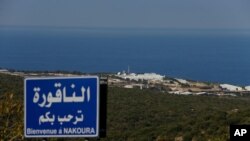U.S.-mediated maritime border talks between Lebanon and Israel start in earnest on Wednesday, following a recent opening ceremony. Technically in a state of war and with no diplomatic relations, both countries claim some 860 square kilometer of the eastern Mediterranean’s potentially hydrocarbon rich waters.
Held at the United Nations’ peacekeeping force headquarters in Lebanon’s southern town of Naqoura, observers hope the talks will delineate disputed waters that both Lebanon and Israel claim as part of their own exclusive economic zone.
Negotiators from each side will sit at the same table but communicate through U.N. and U.S. mediators.
Some analysts say successful talks could lead to oil and gas discoveries helping to revive Lebanon’s devastated economy. However, Lebanon is convulsing through the worst financial crisis in its modern history, only to be compounded by the destructive Beirut port blast in August, causing billions of dollars worth of damage.
Energy experts and other analysts, like Dania Koleilat Khatib of the American University of Beirut’s Issam Fares Institute, say that even if commercial quantities of gas or oil were discovered, it could take years before Lebanon would benefit from it financially.
“By the time you demarcate, you extract, it doesn’t happen overnight, it takes you years," Khatib said. "By then, is gas going to be useful in 10 years? They are wishing that if we can demarcate, then we can get some deal. It’s for public consumption: we are a gas-producing nation. I don’t think it will immediately bring money to the country.”
Speaking to Arab News, Mohanad Hage Ali of the Malcolm H. Kerr Carnegie Middle East Center said: “Negotiating with Israel has important political and security results as it will lead to reducing current tensions.”
Some analysts including Khatib tell VOA that if sea border talks lead to others on resolving the land border, then those negotiations might undermine the Iranian-backed Hezbollah's justification for holding on to its weapons.
"We still have contested land. The Israelis are still in Shebaa Farms in the south," she said. "But as long as Israel is in Shebaa, Hezbollah will always claim that Lebanon is under occupation and this will give justification for its arms. When Israel leaves Shebaa, Hezbollah doesn’t have any excuse to keep arms.”
Hezbollah is both a Shiite militia that has fought several wars against Israel and a dominant force in Lebanese politics, with seats in parliament. The group argues that the maritime talks neither infer normalization nor reconciliation with Israel.




